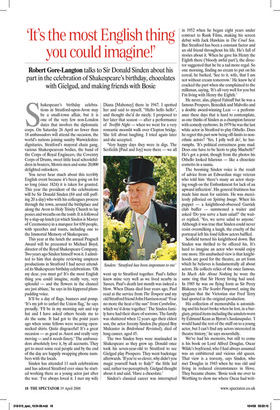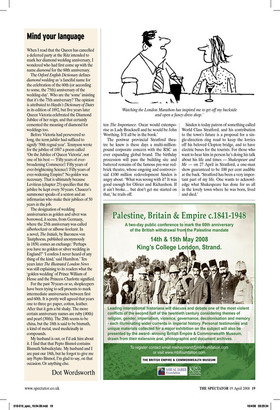‘It’s the most English thing you could imagine!’
Robert Gore-Langton talks to Sir Donald Sinden about his part in the celebration of Shakespeare’s birthday, chocolates with Gielgud, and making friends with Bosie Shakespeare’s birthday celebrations in Stratford-upon-Avon may be a small-town affair, but it is one of the very few non-London dates that involves the diplomatic corps. On Saturday 26 April no fewer than 18 ambassadors will attend the occasion, the world’s nations joining sundry Warwickshire dignitaries, Stratford’s mayoral chain gang, various Shakespearean bodies, the band of the Corps of Royal Engineers, the Coventry Corps of Drums, sweet little local schoolchildren in boaters, Morris men and some 20,000 delighted onlookers.
You never hear much about this terribly English event because it’s been going on for so long (since 1824) it is taken for granted. This year the president of the celebrations will be Sir Donald Sinden (84 and still puffing 20 a day) who with his colleagues process through the town, around the birthplace and along the Avon to Holy Trinity Church to lay posies and wreaths on the tomb. It is followed by a slap-up lunch (at which Sinden is Master of Ceremonies) in a marquee for 650 people, with speeches and toasts, including one to the Immortal Memory of Shakespeare.
This year at the lunch the annual Pragnell Award will be presented to Michael Boyd, director of the Royal Shakespeare Company. Two years ago Sinden himself won it. I admitted to him that despite reviewing umpteen productions in Stratford I had never attended its Shakespeare birthday celebrations. ‘Oh my dear, you must go! It’s the most English thing you could imagine, really very, very splendid — and the flowers in the chancel are just ablaze,’ he says in his kippered plumpudding voice.
It’ll be a day of flags, banners and pomp. ‘It’s my job to unfurl the Union flag,’ he says proudly. ‘I’ll be in my morning suit and top hat and I have asked others beside me to do the same. It had got to the point years ago when some fellows were wearing opennecked shirts. Quite disgraceful! It’s a great occasion — as good as Ascot and really very moving — and it needs finery.’ The ambassadors absolutely love it, by all accounts. They get to meet some real people and by the end of the day are happily swapping phone numbers with the locals.
Sinden has attended 11 such celebrations and has adored Stratford ever since he started working there as a young actor just after the war. ‘I’ve always loved it. I met my wife Diana [Mahoney] there in 1947. I spotted her and said to myself, “Hello hello hello”, and thought she’d do nicely. I proposed to her later that season — after a performance of Twelfth Night — when we went for a very romantic moonlit walk over Clopton bridge. She fell about laughing. I tried again later and she accepted.
‘Very happy days they were in digs. The Scofields [Paul and Joy] were there — we all went up to Stratford together. Paul’s father knew mine very well as we lived nearby in Sussex. Paul’s death last month was indeed a blow. When Diana died four years ago, Paul read at the service from The Tempest and my old Stratford friend John Harrison read “Fear no more the heat o’the sun” from Cymbeline, which we’d done together.’ The Sinden family have had their share of sorrows. The family was shattered when 12 years ago their eldest son, the actor Jeremy Sinden (he played Boy Mulcaster in Brideshead Revisited), died of lung cancer, aged 45.
The two Sinden boys were marinaded in Shakespeare as they grew up. Donald once took his seven-year-old to Stratford to see Gielgud play Prospero. They went backstage afterwards. ‘If you’re so clever, why didn’t you magic yourself back to Italy?’ the little lad said, rather too perceptively. Gielgud thought about it and said, ‘Have a chocolate.’ Sinden’s classical career was interrupted in 1952 when he began eight years under contract to Rank Films, making his screen debut with Jack Hawkins in The Cruel Sea. But Stratford has been a constant factor and an old friend throughout his life. He’s full of stories about it. When he gave his Henry the Eighth there (‘bloody awful part’), the director suggested that he be a tad more regal. So one morning, finding no cream to put on his cereal, he barked, ‘See to it, wife, that I am not without cream tomorrow.’ He knew he’d cracked the part when she complained to the milkman, saying, ‘It’s all very well for you but I’m living with Henry the Eighth.’ He never, alas, played Falstaff but he was a famous Prospero, Benedick and Malvolio and a double award-winning Lear — a performance these days that is hard to contemplate, as one thinks of Sinden as a champion farceur with comedy eyebrows. In 1979 he was the last white actor in Stratford to play Othello. Does he regret this part now being off-limits to nonethnic actors? ‘Yes, I jolly well do’, he harrumphs. ‘It’s political correctness gone mad. Does one have to be Scots to play Macbeth?’ He’s got a point, though from the photos his Othello looked hilarious — like a chocolate cornetto in a sauna.
The booming Sinden voice is the result of advice from an Edwardian stage veteran who told him ‘there’s many an actor sleeping rough on the Embankment for lack of an upward inflection’. His general fruitiness has made him meat for satirists. He was mercilessly pilloried on Spitting Image. When his puppet — a knighthood-obsessed Garrick club buffer — summoned a waiter and asked ‘Do you serve a ham salad?’ the waiter replied, ‘Yes, we serve salad to anyone.’ Although it was true that Sinden could never resist overmilking a laugh, the cruelty of the portrayal left his fond fellow actors baffled.
Scofield turned his knighthood down. But Sinden was thrilled to be offered his. It’s hard to imagine an actor who would enjoy one more. His unabashed view is that knighthoods are good for the theatre, an art form which he believes is fundamentally all about actors. He collects relics of the once famous. In Much Ado About Nothing he wore the same ring that Sir Henry Irving had used. In 1985 he was on flying form as Sir Percy Blakeney in The Scarlet Pimpernel, using the spyglass that the Victorian star Fred Terry had sported in the original production.
His collection of memorabilia is astonishing and his heart broke when he lost, in a burglary, prized items including the amulets worn by Edmund Kean as Byron’s Sardanapalus. ‘I would hand the rest of the stuff on to a young actor, but I can’t find any actors interested in theatre history,’ he says mournfully.
We’ve had his memoirs, but still to come is his book on Lord Alfred Douglas, Oscar Wilde’s boyfriend, who I had always assumed was an embittered and vicious old queen. That view is a travesty, says Sinden, who met Douglas in 1943 when he was old and living in reduced circumstances in Hove. They became chums. ‘Bosie took me over to Worthing to show me where Oscar had writ ten The Importance. Oscar would extemporise as Lady Bracknell and he would be John Worthing. It’ll all be in the book.’ The postwar provincial Stratford theatre he knew is these days a multi-millionpound corporate concern with the RSC an ever expanding global brand. The birthday procession will pass the building site and battered remains of the famous pre-war redbrick theatre, whose ongoing and controversial £100 million redevelopment Sinden is angry about. ‘What was wrong with it? It was good enough for Olivier and Richardson. If it ain’t broke... but don’t get me started on that,’ he trails off. Sinden is today patron of something called World Class Stratford, and his contribution to the town’s future is a proposal for a single-direction ring road to keep the lorries off his beloved Clopton bridge, and to have electric buses for the tourists. For those who want to hear him in person he’s doing his talk about his life and times — Shakespeare and Me — on 27 April in Stratford, a one-man show guaranteed to be 100 per cent audible at the back. ‘Stratford has been a very important part of my life. One wants to acknowledge what Shakespeare has done for us all in the lovely town where he was born, lived and died.’



















































































 Previous page
Previous page